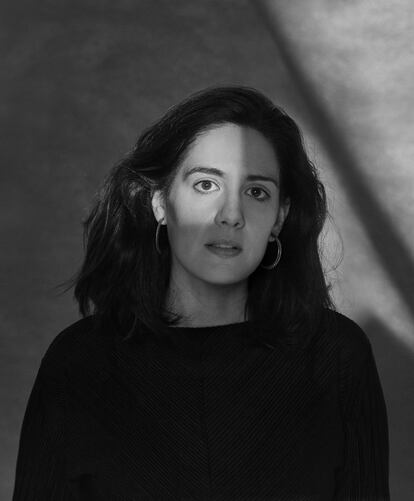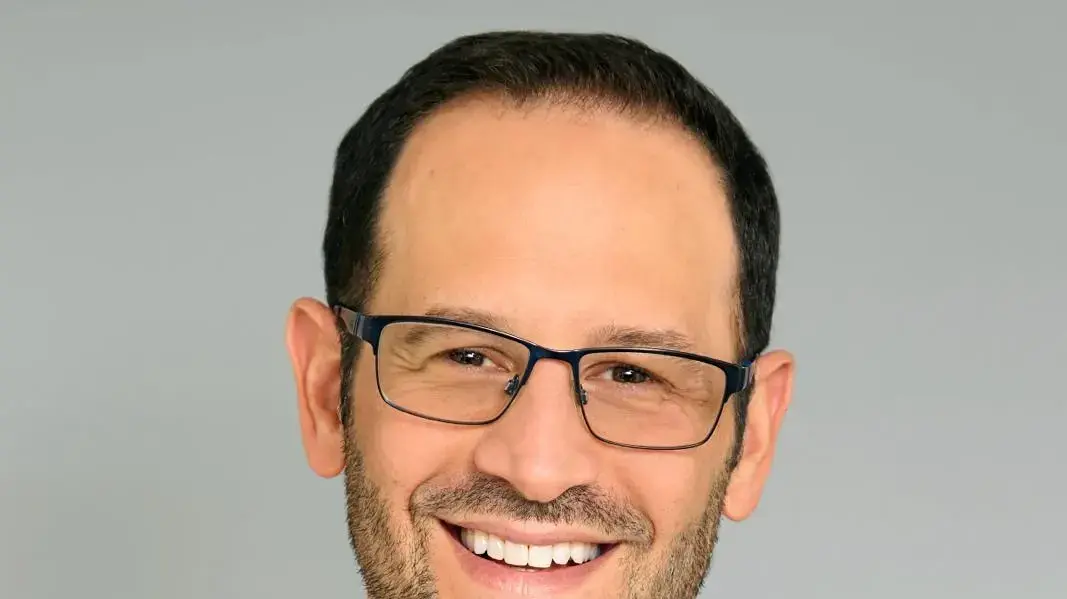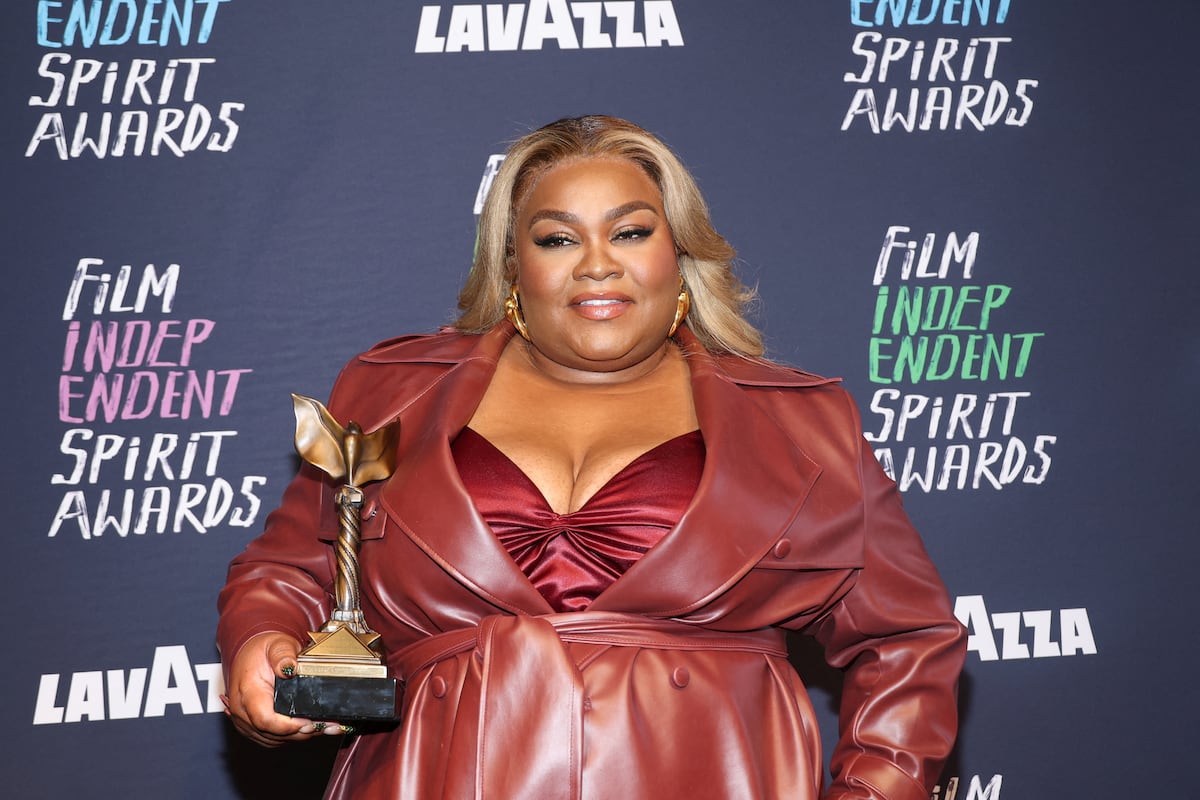Carla Simón's taxi ride couldn't be more emotional.
Arantxa Echevarría (arrived by AVE from Madrid), Pilar Palomero and Clara Roquet are waiting for her at the door of the Beckett theater in Barcelona, where they are going to eat and take pictures together.
Eight days ago
Alcarràs,
Simón's second feature film, has won the Golden Bear at the Berlinale: the Barcelonan is the first Spanish filmmaker to win a class A festival, the most important in the world.
And although they have spoken on the phone between them, they have not yet seen each other face to face;
Simón is still finishing off the sound of the film after the premiere in Germany.
They are also four of the last five winners of the Goya for Best New Director.
Only Belén Funes is missing, who is in Valencia for the recording of a series.
They have never been photographed together, and they make up the community of the amulet, of which they want to talk little, but which exists and has been passed from one to another as a magnet for luck in the Spanish film awards.
Simon, smiling, constantly touching her four-month pregnant belly,
More information
Carla Simón and Clara Roquet, two women leading the revolution in Spanish cinema
As happened in
Summer 1993
(2017),
Alcarràs
—which will be released commercially on April 29, after its screening, yesterday, Saturday, in the Official section out of competition at the Malaga festival— is inspired by Simón's family (Barcelona, 35 years old), the mother, dedicated to the cultivation of fruit trees in an artisanal way, a business that is living its last days due to the fall in prices in the Segriá region, west of Lleida.
Simón and Roquet met 12 years ago, when they met as interns in the rooms and corridors of Diagonal TV, a production company specializing in series.
Of the five, they are the ones who have been friends the longest.
“I decided that I wanted to make movies in my first year of high school.
I had an Image subject and her teacher gave us
Unknown Code,
by Michael Haneke”, remembers the winner of the Golden Bear. “The film is very good, but the subsequent discussion revealed to me the power of cinema, its ability to tell very deep things.
Unknown code
is a choral film, which talks about solitary confinement, it challenged me.
I had seen little cinema until then, and at that moment I abandoned the idea of studying Journalism.
Later, on an exchange in California, I studied screenwriting, and in the end, when I went to London with a scholarship [she did a Master of Arts at the London Film School, after finishing Audiovisual Communication at the Autonomous University of Barcelona], I turned to directing” .
Although it is one thing to study and another to feel like a filmmaker: “The word filmmaker seems fairer to me than that of director.
Because there are many ways to make cinema”, she explains.
The closing gala of the Berlinale was lived in its final stretch, when the powerful prizes are announced in reverse order of importance, hand in hand with its producer, María Zamora.
“When they announced the jury's justification for awarding the award for best direction to Claire Denis [Simón idolizes the Frenchwoman's work] I thought it was for me.
Minutes later, when I heard
Alcarràs
from the mouth of M. Night Shyamalan, president of the jury, it was hard for me to accept that he had won”.
Of her congratulations, she was moved, among others, by the Peruvian based in Spain Claudia Llosa, who won the Golden Bear in 2009 with
The frightened tit,
that of Agnès Varda's daughter and Carlos Saura's.
"He won in Berlin in 1981 with
Hurry, hurry,
a film that helped me understand the story of my parents."
AIDS took his parents away from him when he was a child, and Simón went to live with his aunt and uncle and with a slightly smaller cousin, as he recounted in
Verano 1993.
Carla Simón debuted in 2017 with 'Summer 1993', a film with which she won the Goya Award for new direction and represented Spain at the Oscars.
In February she won the Golden Bear at the Berlinale with 'Alcarràs'. Caterina Barjau
Sitting at the table, the four order the same menu: cream of the day and rice with pork.
The talk does not start with thoughtful reflections on the cinema.
It doesn't even end.
In fact, they talk about mutual friends, Simón's pregnancy, Echevarría's children, where they were on Wednesday afternoon when Simón won (they saw him live through the festival website) and possible or alleged love affairs.
When movies are finally heard, it's because they tell each other about the current status of their projects, exchange contacts to solve future problems and share opinions about other films.
Zero competition.
On one side, the two quietest, Simón and Palomero, who speak calmly and slowly.
To the other, two forces of nature, Roquet and Echevarría, of tremendous verbal outburst.
Arantxa Echevarría (Bilbao, 53 years old) is the oldest of the group.
She and she the second to win the Goya for best director of the novel in the lineup of five directors that Simón started.
She was the initiator of the amulet community.
"Actually, it's Paula Ortiz's thing," says the director of
Carmen y Lola.
“A friend of hers gave her a statuette to bring her luck at the 2016 Goyas, in which she participated with
Her Girlfriend,
but she forgot it at home.
She decided that another woman would take advantage of her power.
And she chose me.”
Since they couldn't meet, Ortiz sent him a photo of the amulet.
That is the image that passed through whatsapp from Echevarría to Belén Funes (Goya for
The daughter of a thief),
from Funes to Pilar Palomero
(The girls,
who even won the award for best film at the Zoom gala) and from this to Clara Roquet
(Libertad),
who raised the big head on February 12 in Valencia.
"There are no specific rules," they warn between laughs.
And they consider whether the next edition will be passed on to a single director or to several.
“We'll see, we'll hold a council,” jokes Echevarría.
She decided to become a director as a child.
“My father was very fond of movies, and he hit me.
When I was eight years old, I was saying that she was going to be a director”.
Although, did she know what that meant?
"No way!
I thought it was making movies like Chaplin.
My older brother was also very fond of it and the first time I went to a theater, to the Bogart in Madrid, he took me to see
2001, a space odyssey,
because there was a Kubrick cycle.
At the exit he was only able to say: 'I loved the monkeys!';
actually the only part he had understood.”
Echevarría and Simón delivered the Goya at their gala to Funes.
“I remember that emotion of the three on stage, although nothing compared to Carla at the Berlinale.
When they said
Alcarràs,
I screamed...”.
Right now, Echevarría is in the pre-production of his third feature film, after the comedy
The Perfect Family,
which will focus on the second generation of Chinese in Spain.
Bethlehem Funes.
This director's first film, 'La hija de un ladrón', earned its protagonist, Greta Fernández, a Silver Shell.
The film won three Gaudí awards and the Goya for new direction in 2020. Caterina Barjau
Belén Funes (Barcelona, 38 years old) has hurt her soul to miss the match.
She is in Valencia, where she directs a series about the bakalao route with Borja Soler and Carlos Marqués-Marcet.
Funes belongs to the volcanic force faction of the quintet, and is always remembered as such.
“I wanted to make movies since I was a teenager.
I started writing and ended up studying Directing at ESCAC [the Catalan Film School].
And yet, I didn't see it clearly until I met Mar Coll”.
Coll's name will also end up mentioned by the rest of her companions, who consider
Three days with the family
(2009), a benchmark, almost a founding film.
"I worked as his meritorious in that drama," recalls Funes, who has worked hard in various technical positions on numerous shoots.
“I started recording rehearsals.
And I saw Mar explaining the script to the actors, what she wanted from them and how she would look like herself with super pretty energy... Suddenly, I thought, 'I want to be like this aunt.'
I imagined myself doing it.”
On that shoot, Funes also met other technicians with whom she and other members of the wave of Catalan women filmmakers have worked.
"A lot of people came together who over time have been fundamental in this cinema."
An example of this forward-looking spirit, Funes recalls that although the first person she met was Simón, with Roquet she shared many common friends.
“My short
Sara on the run
and his
El adiós
coincided in 2015 at several festivals, and I ended up sending him a message in which I wrote: 'We don't know each other and very sincerely I think we should do it now [laughs]”.
Over time, she ended up being Roquet's script [technologist who oversees the film's continuity] in
Libertad.
From left to right, Carla Simón, Pilar Palomero, Arantxa Echevarría and Clara Roquet, at the Sala Beckett bar in Barcelona. Caterina Barjau
Regarding the Spanish triumph at the Berlinale, Funes explains: “There is no turning back.
Both in Spain and around the world”.
He refers to the fact that since
Nomadland won in Venice 2020,
of Chloé Zhao, the main festivals and award ceremonies have been dominated by women: the last two editions of Venice, the last two of San Sebastián, Sundance 2021, the past Oscars, the last Cannes and the Goya 2021 were directed films by women.
“The nice thing was to see that on Twitter everyone was happy about Carla's Bear, as if it were their own, without any bad vibes.
The filmmaker Elena López Riera wrote on that network: 'This is good for everyone.'
Of course.
There is no desire for competition.
In addition, they are very militant super-narrators, something fundamental today.”
Funes points out: “What Carla has done is very big.
What a genius she.
I saw it on my mobile, in Valencia, locating, because Leticia Dolera passed the link to a group to see the Berlinale ceremony, and she shouted to those around me:
Pillar Palomero.
The first feature film by this Zaragozan, 'Las Niñas' (2020), won the Goya for New Direction and Best Screenplay.
The film was a phenomenon that also collected three Feroz awards and a Forqué. Caterina Barjau
At lunch together they remember how the Goyas have been chained.
“The most unpredictable thing in world cinema is the Spanish Film Academy,” one of them jokes anonymously.
Another streak that unites them: from December 25 to 30, the birthdays of Nely Reguera —director of
María (y los otros) (2016), who premieres her second feature film,
La voluntaria—
at the Malaga festival.
, Funes, Simon and Roquet.
"Another thing we share," explains Echevarría, "is that we won the Goya for novel and we also competed for best film, which only Pilar has won."
They laugh at a video of Cate Blanchett who says that she is interested in “Clara's cinema... Roquet”.
The aforementioned believes that the actress was told names of filmmakers who were in the trophies of Spanish cinema, in which the star received the first international Goya, and that is why she mentions her.
By the way, Simón has passed her classes as a teacher at Pompeu Fabra to Roquet this year.
There are jokes at the table: “The students will freak out.
One tutor has just won the Goya, the other the Golden Bear”.
Lazada in her role as entertainer, Echevarría puts Simón between a rock and a hard place: “Come on, gossip about everything”.
And the director of
Alcarràs
confesses that she premiered on Tuesday at the Berlinale, and that night, in the small celebration after the gala, they received the call from the organization.
“That we stay the next day, maybe...”.
The other diners applaud happily.
Pilar Palomero (Zaragoza, 41 years old), who is now editing her second feature film,
La maternal,
confirms this sisterhood.
“We are partners, we know the ins and outs of the projects, we read scripts of others.
For example, I already did a screening of my new film with a first montage and I invited Clara, who couldn't come, and Celia Rico did see it —I was her script in
Viaje al cuarto de una madre—
, at the Goyas I was with Belén... There is a precious synergy”.
Palomero also decided to make movies as a child.
"But I didn't think she could be a director, really."
She studied Hispanic Philology in her hometown, and going to the Aragonese film archive she discovered “that there was a language” that she wanted to know.
"Bigas Luna did a workshop in Zaragoza, I signed up and understood that cinema was a possibility and a job," she recalls.
Even so, she wandered around studying in Madrid and Sarajevo, and working in Zaragoza.
“The lack of references plays against us.
As a child you saw it as a dream rather than a reality.
Hence the essence of Simón's phrase with the Bear in his hand: "This award serves so that those who come after do not even doubt that they can make movies."
Palomero reveals that there is a whatsapp group of fifteen female directors and through him he discovered,
after a happy message from Irene Moray, what she was missing.
“I am quite closed and disconnected from reality.
I got the joy."
Clara Rochet.
Scriptwriter of films such as Petra, by Jaime Rosales, this Catalan made her directorial debut in 2021 with 'Libertad', a film with which she won the Goya for new direction at the last awards ceremony. Caterina Barjau
The youngest, Clara Roquet (Barcelona, 33 years old), is instead a veteran screenwriter.
“When I was 14 years old I saw
The 400 Blows,
and I thought that was my thing”.
Through her uncle, Miquel Obiols, a writer of children's and youth literature and a television scriptwriter —he invented the gallifantes of the Children's
Game program—,
she understood that from the newsroom she could go little by little.
“I love to read, and even today I consider myself more of a screenwriter than a director,” she insists.
What's more, the award winners of the Berlinale caught him in another installment of the script, this time for a series for Movistar.
She has written for Jaime Rosales, Carlos Marques-Marcet, Ventura Durall or Mounia Akl.
In 2020, the presence of women in Spanish cinema was 33%, according to a report by CIMA, the audiovisual women's association, when there are the same number of female students as male students in film schools, a proportion that reflects society Spanish.
When will equity be achieved?
For Roquet, "we should ask for that parity in the project evaluation committees of the ministries, of television, in the selection of festivals... I don't want quotas for films by directors, I do want balance in those juries."
The next step to conquer, they point out in unison at the table, is that there be four women at the Goya for best direction.
It sounds like something far away.
"Why are we going to compete?" Roquet snaps.
“The cake to be distributed is very small.
Let's not hit each other for crumbs, but for making it grow.
And there will be more portions.”
Exclusive content for subscribers
read without limits
subscribe
I'm already a subscriber















